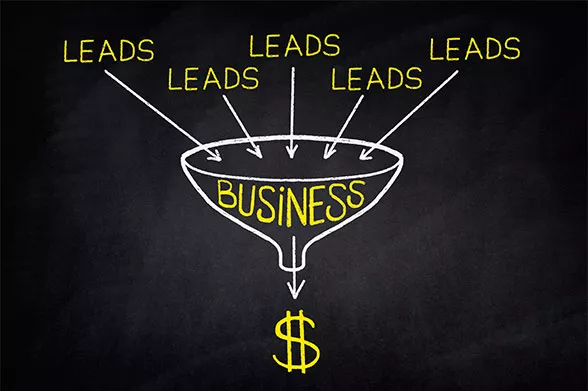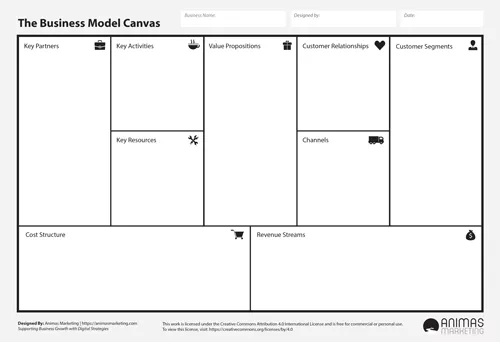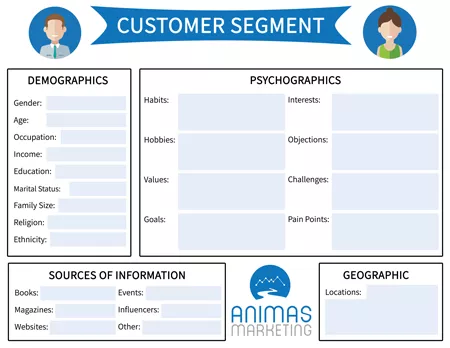When someone is interested in going off on their own and starting a business, there are so many questions to be asked and factors to be considered.
It can be overwhelming…
We get it.
We have been there as well.
That is why we decided to compile this list of everything you will need as an entrepreneur to get started on your new business.
Let’s get started.
1. Develop a Plan & Establish Business Goals
This should be one of the very first things you do as an entrepreneur. What is a business without any sort of solid plan or goals?
Don’t worry…
It doesn’t have to be as crazy complicated as you may think. There doesn’t have to be an exact format to follow when coming up with a long-term plan for your new company.
But, there is a couple of ways you could go about it…
Many new entrepreneurs decide to craft a well-detailed business plan. The general format of the business plan has been around for decades and is usually made up of 9 essential sections.
- Executive Summary
- Business Description
- Market Analysis
- Management and Organization
- Marketing and Sales Management
- Product or Service Line
- Funding Requirements
- Financial Projections
- Appendix
This detailed business plan will be required by most financial institutions if you are asking for start-up funds.
If you’re not requesting money, do you really need this whole “business plan”?
That is completely up to you…
and how you want to build your own custom plan.
When I began my business, I did not have a full-scale business plan, but I made sure to set goals for myself to achieve success.
That’s really what it boils down to.
You can decide how your business plan looks if you have well-defined goals in place.
We recommend using a resource such as the Business Model Canvas to assist in crafting a good plan for your business.
With some solid goals in place for your business, it is a good time to research the industry and competition.
2. Market and Competitive Research
What sets your business apart from the competition?
In fact… who IS the competition?
After constructing long-term business goals, it is a good idea to research and understand not only the industry in which you are entering… but the competition that is in place.
It is essential to know what others are pricing their products or services in the marketplace as well as how much competition you will be dealing with.
Once you have a good idea on the competition and the market that you are entering, what is unique about your product or service?
Think about it…
Why would any person buy your product or service over the competition?
You could try and offer a lower price, but we do not recommend using price as your unique selling point as that can turn into a slippery slope fast.
You offer a lower price, then the competition matches the prices and the whole market takes a hit… you get the idea.
Come up with something better. Something more unique.
The unique value proposition is one of the nine elements of the Business Model Canvas and is fundamental in crafting a product or service that people are going to purchase.
Which brings us to the next question… who are these people?
3. Know your Target Audience
Knowing your customer segments is going to be essential in almost every step of the sales and marketing process for your business.
This will help you craft compelling messages to your audience, set the tone of your business, and better understand how to come up with the best possible products and services.
Often, new business owners will build their target audiences based on geographic and demographic features such as age, gender, income, location, and education level.
This is only part of the customer segment “equation”.
What many entrepreneurs fail to build upon during this stage is the psychographic traits.
These psychographic traits are a necessary part of building the ideal target segment(s) for your business.
What is psychographics?
Psychographics is the qualitative measure of personality, interests, lifestyles, opinions, and attitudes.
While geographic location helps you understand where your customer is located and demographics help explain who your customers are… psychographics explain the why of the customer segment.
For example, what sort of challenges does your target audience face daily? What sort of interests does your audience have?
What would deter a potential customer away from buying your product or service?
All of these factors are included with the psychographic traits of a user and is necessary when crafting unique messages to deliver on emotional and rational levels.
Since we understand just how essential this step is, we created a customer segment worksheet that you can download for your own business. Feel free to fill it out online or print it out and tack it up on the wall.
For example, if you were setting up a fitness business, knowing the age of your audience can help you craft the right deals and messaging to bring in new customers. You could also study what times that audience leaves/arrives at work or is more likely to stop by the gym so you can know how to best gain their attention.
At this point, we have come up with a solid business plan, researched the marketing and competition, and understand the target audience (to the best of our knowledge).
Let’s come up with your core products or services.
4. Develop Your Product or Service
If you do not have a clear understanding of your customer segments, we recommend take a step back before crafting your core products or services.
This is important.
If you do not know who it is that you are providing the perfect solution for, then how can you come up with this perfect solution?
OK, now for the exciting part.
We know how great it can be to bring an idea into a product or service, but it also takes quite a bit of time and work for it to come to fruition.
For example, if you need to craft a product, you may need to reach out to a technical team or an engineer to help build that product.
Perhaps you need to mass-produce an item. Then you must research and reach out to manufacturers.
If you are coming up with services, it is important to have a detailed layout of every service that you are going to offer and the value that it is going to provide to your target audience.
Also, when you are coming up with a detailed description of each service, you can make sure that each customer in the future is going to know exactly what they are getting, eliminating communication issues on delivering the value.
This process can be understandably challenging – which is why it can be important to work with one of the best online marketing agencies to deliver the value to your customer in the right way.
OK, fun part is over.
Let’s talk about the legal requirements and the resources you must look at when building your new business.
5. Legal Structure
While you may be dreading having to work through the legal steps to start your business, we’re here to make it easy for you.
In fact, this can all be completed in under an hour.
Ready? Let’s set the timer and…. GO!
Business Structure
First, it is necessary to decide what type of business structure you would like to have for your new business. The 4 most common types of businesses are..
- Sole Proprietorship
- Partnerships
- Corporations
- Limited Liability Companies (LLC)
- Subchapter S Corporations (S Corporations)
Each business type has its own benefits and setbacks, but most solo entrepreneurs decide to start either with a sole proprietorship due to the simplicity and ease of setup or a Limited Liability Company (LLC) due to the legal protections it provides.
Business Trade Name
After you decide on the business structure, it is time to register a trade name. This can be done through your state’s secretary of state office.
Before you decide on registering a specific trade name, make sure you check out your state’s current business database and that no one else has rights over the name.
It is also a good idea to check out domain names during this time to see if you can obtain a matching domain name to the trade name that you are looking to register.
Don’t forget to check your state’s requirements for new businesses as well.
While for most entrepreneurs, registering your business is as simple as registering the trade name… it is still a good idea to double check your state requirements, so you don’t miss something.
EIN Tax ID
We all love to pay taxes and a visit to the IRS website is most likely a thrill for you.
Right… (scotty)
Well, if you are any other business entity other than a sole proprietor, then you will need a EIN tax ID number.
While for sole proprietors, you can use your personal social security number and complete taxes on your person tax return, other business entities require the Employer Identification Number (EIN).
Luckily, you can simply apply online through the IRS website.
Permits, Licenses, Trademarks, Copyrights, Patents, and Beyond
Most fresh entrepreneurs will not have to deal with permits or licenses but as mentioned previously, it can depend on the state which you reside in and the state which you would like to run the business.
Check all local laws and regulations on a federal, state, and county level to make sure you are clear to run your business without running into any legal issues.
Congratulations!
You are now legal and in the clear. Let’s talk about the dough.
6. Finances & Start-up Capital
While it would be ideal that every entrepreneur had enough capital to invest in the business themselves, that is usually not the case.
Luckily, there are solutions to help fund your new venture.
Let me start off by saying…
Don’t even think about borrowing money unless you have built a solid plan and know you will be able to pay the money back with interest.
We have seen it too many times…
Someone gets very excited about an idea, takes out a personal loan, fails at meeting their expectations, and is unable to pay off the $40,000 they borrowed from the bank.
Always keep a clear head and consult with others when making this big choice that could affect a large part of your life.
Now that we got that out of the way…
How the heck are you supposed to get money for your business?
There are more options than you might think.
Here are a couple of ideas to consider when trying to find capital for your new business.
- Borrow from friends and family
- Use a credit card
- Apply for a micro loan
- Crowdfunding
- Home Equity Line of credit
- Local Small Business Development Programs
Depending on your current assets, credit, and financial position, you could be eligible to many or few of these options.
We recommend researching each option carefully before making a final choice on funding.
Also, keep in mind to research and local small business and economic development programs that could lead you in the right direction for obtaining the capital for your new venture.
Once you get the money, where are you going to put it?
7. Business Bank Account
While a trip to meet a business manager at your bank may not be the most exciting trip of the year, opening a new business account should be a piece of cake.
Just keep in mind to have your EIN tax ID number and trade name applied for before opening your business bank account.
Now, it’s time for people to find you. Even if you have a brick-and-mortar store, it’s essential to have a website for your target audience.
8. Website & Email Address
Luckily, it’s now cheaper than ever to get a website crafted for your business.
What used to be a question of money is now a question of whether to create the website yourself or not.
Many new entrepreneurs will craft their first website using a DIY website builder such as Square Space or Wix.
While these platforms are affordable and easy to create a website with drag-and-drop builders, they may not be a great investment for the long-term capabilities of your business.
The issue that many new business owners run into when they build a site themselves on one of these platforms is the lack of ability to expand with additional features.
Also, if you are trying to have your website rank on search engines such as Google in any sort of competitive market, then DIY website builders do not allow many of the functions to customize the site for search engine optimization (SEO).
We recommend having the website built on the WordPress platform and if you are still not convinced, then explore the comparison of Wix vs WordPress to see the features side by side.
Not only does the content management system (CMS) power over 30% of websites on the internet, but the capabilities are endless, so you can build out the SEO and additional features without any issues.
You can work with a live developer with WordPress and have a brand-new site built for as little as $1049.
This way, you can feel safe knowing that you won’t be limited when you are ready to grow your business.
9. Accounting Software 
We all took accounting in high school or college.
We also don’t remember a thing about accounting from school. Ledgers, balance sheets, credits, and debits…
If you’re like me, then “no thanks”.
With programs like Quick Books, accounting has never been easier and cheaper.
With low-cost or even free plans per month, having an accounting software running your finances is extremely helpful in understanding the costs and revenues associated with your new business.
Also, you can save a ton of time not having to re-learn all that crap about ledgers and balance sheets.
Can you tell how much I love accounting?
10. Create a Sales Funnel
Many new entrepreneurs have heard of building a sales funnel but do not actually understand how it is done.
While there are many terms and different methods to creating a sales funnel, each method comes down to a simple concept. And that is…
The customer journey.
Most likely, your target audience is going to be directly buying your product or service out on a whim.
They usually go through a customer journey to be introduced to a brand and to engage with it before they decide to make any sort of transaction.
Think of it like a normal relationship.
If you were to go out with someone on a first date and asked them to marry you, there is a good chance that they would leave and probably never speak to you again.
The same goes for selling your product or service.
You want to have your ideal customer interested in you, talking about you to their friends, and seeing you multiple times before you take them to the next level in the relationship.
While there are countless resources on building out a customer journey, the steps usually look something like this.
- Aware
- Engage
- Subscribe
- Convert
- Excite
- Ascend
- Advocate
- Promote
Whatever you do… don’t ask your ideal customer to marry you on the first interaction with your business.
11. Social Media Presence
Remember when we were building out the customer segments for your business?
Well, once again, it is going to come into play when deciding on what social media channels to have your business on.
While we recommend most businesses having a Facebook page, there are many other platforms that could be extremely beneficial.
The question is… where is your target audience hanging out?
If your ideal target audience is composed of females between the ages of 25-45 then you might want to use a platform such as Pinterest.
Or perhaps your target audience has interests in technology and is between the ages of 18-29. Then Twitter might be the platform for you.
The benefits of social media for your business is impossible to ignore. It’s the best way to promote your business for free.
Regardless of what social platform your business finds itself on, there are a couple of important tips to keep in mind.
- Don’t always promote your brand. Talk to your audience and keep them interested.
- Focus on one or two social media platforms instead of trying to be everywhere at once.
- Use fresh pictures and videos often to keep users engaged.
While social media is a necessary step in starting a business these days, when it’s all said and done, you still need a physical location for your business.
busine12. Find a Location
This is a no-brainer.
Keep in mind though that many entrepreneurs start their new businesses in the comfort of their own home to save on initial costs.
This helps when your business needs to gain traction before bringing in a decent income. You can also save money by listing a home-business space on your taxes.
Otherwise, we recommend checking with your local small business development center for suggestions or choosing a place with a short-term lease.
If you commit to a long-term lease of 3+ years, you might find yourself in a bind when you need to scale your business.
There are also many other lesser-known unique options for locations that can set your new business apart including some entrepreneurs that started on a boat or even a container pop up shop.
Starting Your New Business: Be Serious but have Fun

Many people want to set off to be an entrepreneur and get away from the daily grind of having to work for others… and that’s great!
Keep in mind, from someone who has spent countless hours on building businesses, its hard work.
Really hard work.
It also takes up much more time than most people realize and can impact relationships and family time.
With that said, it can be extremely rewarding once you get most of the hard work out of the way and start making a decent income from it.
Whatever you do, have fun with it… and go in with full support from you family and friends to make sure that your new business is going to be a success.
Try it now for free!
Need Marketing Help?
If you want assistance with marketing strategies to grow your business, then let's talk.


















0 Comments